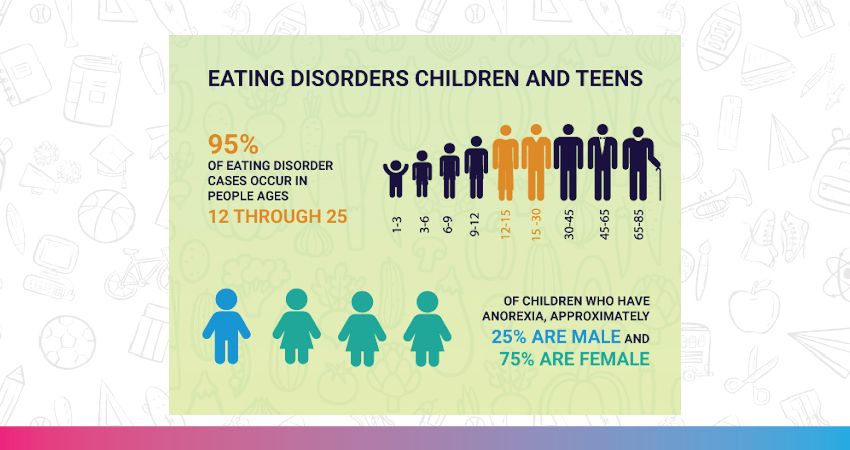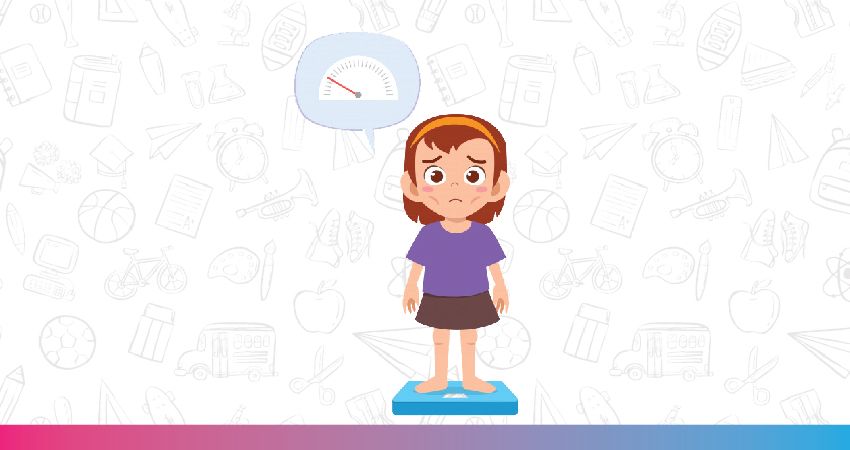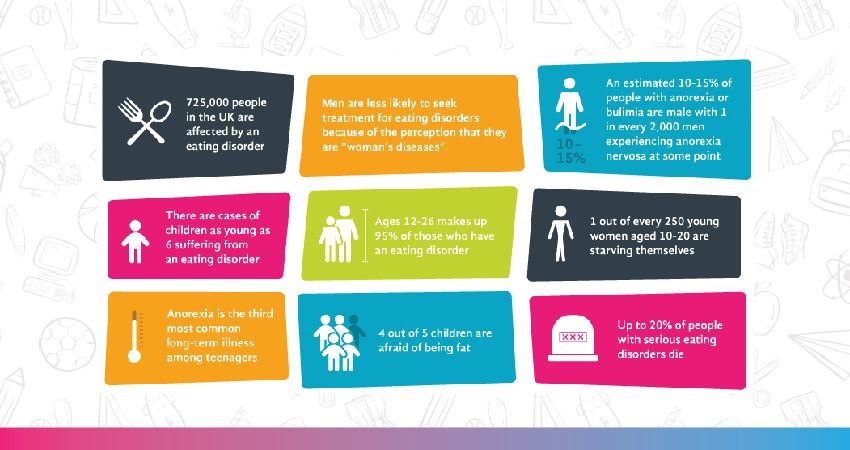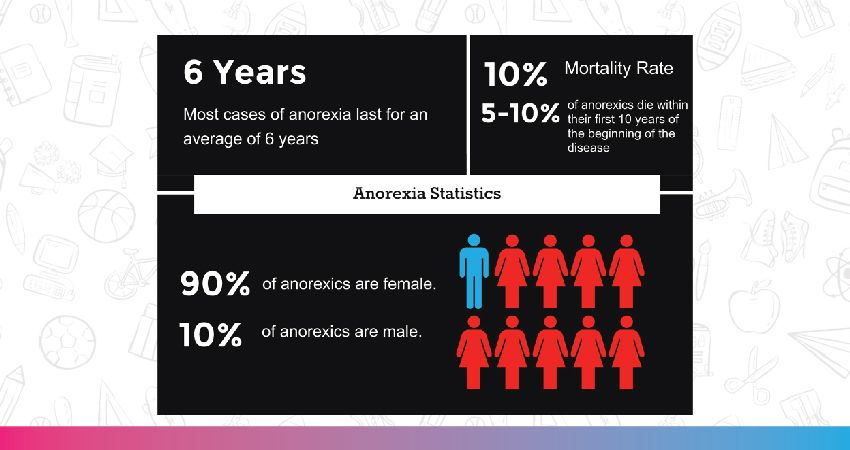Anorexia in children – Causes, Symptoms & Treatment
By Divya Chopra |
Date 05-09-2023

Table of Contents
Admissions Open for
Introduction
Anorexia in children is one of the most common eating disorders observed in kids, usually in teenagers. In this, children develop an unreasonable fear of gaining weight or becoming fat, even when they are underweight or slightly above the normal weight. If you are observing fussy eating periods of your toddler or pre-teen, it could be an Anorexia Nervosa symptom. However, it is always better to understand a condition, before jumping to conclusions.
In an age where children have access to the internet at an early age, they are often misled by the “ideal” way of maintaining their bodies. Online fitness trends are all the rage on social media and to follow this trend, children may take severe steps to achieve a certain body image. They may even indulge in self-starvation for long hours, which may have serious consequences later in life.

Mainly, there are two types of anorexia nervosa:
- Restricted – wherein children consume selected food items in a restricted amount
- Bulimic – wherein children immediately vomit out (self-induced) all the food consumed
This article will guide you through the causes, symptoms and treatment of anorexia in children and what you, as a parent, can do to help your child prevent it.
Causes of Anorexia in Children
.jpg)
Although much research has been conducted to assess the existence and impact of anorexia in children, the actual cause of this eating disorder continues to remain undiscovered. However, based on the findings, three main factors causing anorexia nervosa may be suggested :
- Genetic – Any family member with a history of any eating disorders may be a cause for your child being anorexic. It is also found that children, with family members having a medical history of dealing with weight issues or other physical illnesses, are more likely to develop early signs of anorexia nervosa.
- Social – Conforming to social norms of being ‘skinny’ may be one of the major factors to instigate the fear of gaining weight in children.
- Psychological – Being firm is important, being rigid is not. Children have a tendency to become obsessed with things easily. In this case, they might become rigid in their decision to lose weight at any cost, come what may. They may indulge in restrictive eating habits, which may cause anorexia.
Symptoms are indications of any illness or disease so doctors can identify and treat them accordingly. There are certain symptoms of anorexia in children which could suggest its prevalence. These symptoms can be divided into three categories.
Anorexia Nervosa Symptoms in Children

Behavioural
- Denying feeling of hunger: self-starving even when hungry
- Vomiting immediately after eating: self-induced vomiting
- Talking about weight all the time: checking weight frequently and being upset about it
- Consuming a small amount of selected food: food that is rich in fat, carbohydrates
- The constant fear of being overweight: feeling anxious for not being thin enough

Physical
- Weight Loss: a sudden decrease in weight
- Too much Exercise: hectic, strict routine for exercise
- Irregular/Absence of Menstruation: may also include delay in first periods in girls
- Hair Loss: too much hair fall
- Constipation: irregular, painful bowel movements
- Fatigue: too tired, too soon due to lack of consuming energy-providing food
- Change in Body Temperature – cold feet and hands
- Dry and yellow skin – due to dehydration, lack of nutrients
Emotional
- Depression – You may observe your child being sad and anxious at all times.
- Mood swings – Frequent changes in mood may also be an early sign suggesting anorexia.
- Less social – Does your child avoid social gatherings and wish to be left alone? Maybe it’s time for you to address this as it could be a symptom of anorexia nervosa.
Anorexia Nervosa symptoms in school-going kids is a common and growing phenomenon. It is found more prevalent in females than in males. A study conducted by the British Medical Journal Open in 2019, reported that cases of anorexia nervosa in children nearly doubled in the past decade. These children, whose samples were taken for research, were mostly teenagers.

Similar to other eating disorders, anorexia nervosa can also be treated. However, the degree of treatment varies in children. Treatment for anorexia in children is more case-specific.
Treatment
- Communicate – Communicating with your child about her unusual eating habits can be extremely helpful in understanding their perspective towards the situation. Understand what led them to initiate the eating disorder. Scolding and force-feeding them meals will only make them more restrained towards eating healthy.
- Balanced diet – If kids consume less than what is required for the body to function properly, they are bound to feel weak and fatigued. Once you have established the reason behind their unusual eating habit, helping them get back to eating healthy, could be one of the best ways to treat anorexia. You may also consult their paediatrician or a nutritionist to prepare a diet chart for them.
- Therapy – If the fussy eating periods of your toddler or teen is making him too depressed, it’s best to take him for a therapy session. This will help to assess the severity of his condition. The therapist may also recommend regular counselling, if required, based on her assessment.
- Medication – Doctors reserve medication only for children with extreme illnesses. If your child is too depressed, your doctor or health advisor may prescribe a few antidepressant medicines to make him feel better.
As parents, identifying symptoms of anorexia in your child might seem scary at first and you would want to treat it on your own. However, it is important to know that not everything can be done by us. If required, you should not feel ashamed to seek help from medical health care providers. Anorexia in school going kids may seriously impact their health, leading to disturbed mental health. If not diagnosed early, this eating disorder may become a dangerous threat to your child’s life.
Studies found that among other mental and eating disorders, anorexia in children has the highest (accounting for nearly 10 per cent of the total) mortality rate.

Conclusion
As kids enter their teenage years, they are exposed to an environment that is more social. They participate in various activities and events, like dancing and gymnastics, which require the maintenance of a healthy body image. It is the responsibility of parents to help them understand the difference between being healthy and being skinny. Detecting these early signs of the possibility of anorexia in children can help in ruling out any possible prospect of anorexia in school-going kids, making its treatment faster. Remember, the secret to a healthy life is a healthy diet. All you need to do is be a little more observant of your young kid!
CBSE Schools In Popular Cities
- CBSE Schools in Bangalore
- CBSE Schools in Mumbai
- CBSE Schools in Pune
- CBSE Schools in Hyderabad
- CBSE Schools in Chennai
- CBSE Schools in Gurgaon
- CBSE Schools in Kolkata
- CBSE Schools in Indore
- CBSE Schools in Sonipat
- CBSE Schools in Delhi
- CBSE Schools in Rohtak
- CBSE Schools in Bhopal
- CBSE Schools in Aurangabad
- CBSE Schools in Jabalpur
- CBSE Schools in Jaipur
- CBSE Schools in Jodhpur
- CBSE Schools in Nagpur
- CBSE Schools in Ahmednagar
- CBSE School In Tumkur

Call Us to know more about Orchids
Swipe Up



.jpg&w=1920&q=80)












